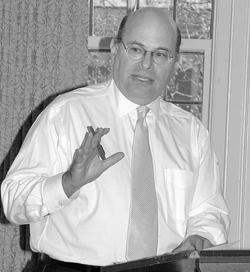By Martin May

The Board of Regents must achieve a tricky balance in which it isn’t meddlesome in the day-to-day running of the University but is informed adequately enough to be a good steward, Board of Regents Chair Laurence Deitch said at an April 24 meeting with the U-M chapter of the American Association of University Professors (AAUP).
Citing the state’s constitution, namely Article XIII, sec. 5, Deitch said the general supervision of the University rests with the board. “Accordingly, there’s a constitutional admonition against micro-managing of the daily affairs of the University,” he said. Selecting a president, however, is a responsibility that is given solely to the regents by the constitution, Deitch added.
While the regents have the final word on who becomes president, Deitch said that they “value the input from the University community as we make our selection.” Deitch alluded to the 16-person Presidential Search Advisory Committee, led by Earl Lewis, dean of the Rackham graduate school, as an effective means of getting a broad range of input.
Deitch made clear that he has no desire to weaken the presidency. He stated that the president is the principal executive officer under supervision of the regents.
“In my view, the president and the president alone is the leader of the University,” he said. The regents, however, determine the general direction and tone of the University.
Deitch said he is proud that the University’s governing boards over the years have helped to “create a university that is egalitarian and accessible to people of limited means but unlimited potential and talent.” In order to maintain this accessibility, the University needs to be run in a business-like way, he added.
“I hope you would agree,” Deitch said to the gathered AAUP members, “that is it critical that we manage our resources wisely. Failing to do that will prevent us from keeping the University financially accessible to people of low and moderate means and prevent us from fairly compensating our talented and dedicated faculty and staff.”
But the focus is not on the bottom line, Deitch said. “When we talk about being efficient and business-like, it’s just so we can do this job as effectively as possible,” he said.
The reason behind the recently implemented changes in Board structure—a chair, vice chair, and audit and personnel committees—is so that the regents can do their jobs effectively and ensure that the University remains in a strong condition, Deitch said.
“I would assert that for us to continue without an audit committee is just irresponsible,” Deitch said. He indicated that previous regents had discussed creating such a committee.
With regard to the vice chair, Deitch said he expects one to be chosen within the next couple of months. He said the process has taken a bit longer because “some regents have been out of town.”
Asked how he sees the role of the regents in selecting a provost, vice presidents and deans, Deitch responded that he ultimately sees those as decisions for the president to make, but added that in “a healthy working relationship, there should be consultation with the regents consistent with our general supervision mandate.”
Regarding his view of the regents’ role in faculty personnel decisions—such as hiring, tenure and termination—Deitch says it is a “hands-off situation for us.” He said the current system for faculty personnel issues should stay in place.
John Lehman, professor of ecology and evolutionary biology, told Deitch that there is a concern among faculty that the regents rely too heavily on the administration. One point of concern was the bylaw change, approved by the Board of Regents last December, that reshuffled the composition of the Board in Control of Intercollegiate Athletics. John Gobetti, professor of dentistry and vice chair of the Senate Advisory Committee on University Affairs (SACUA), said he felt the regents did not allow SACUA to adequately provide its input for the change.
“There’s a lot of attention on athletics, a lot of risk, a lot of difficult decisions that affect the character of the whole institution,” Deitch responded. “When all is said and done, the buck stops with administration, in my opinion, with regard to big-time athletics.”
Gobetti said he would like the regents to meet with SACUA at least once a month, which could be accomplished by having the SACUA chair or vice chair partake in Board of Regents’ meetings.

